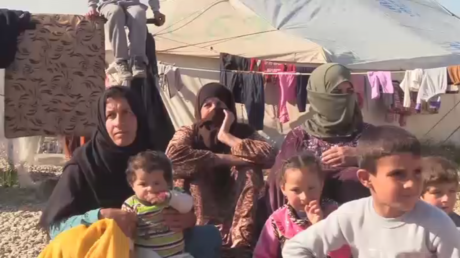‘Deep injustice’: Mosul refugees to RT on surviving ISIS & US-led coalition airstrikes (EXCLUSIVE)
A fortnight ago, the Suleiman family were hiding in their home, waiting for the liberation, but lived through another tragedy instead.
“One morning, ISIS fighters came to our house and banged on the door, saying they wanted to go on the roof. We begged them to leave, saying there were women and children here, but they didn’t care,” one family member told RT at the Rojava hospital in Erbil, located 100 kilometers from war-torn Mosul.
“They went up and started shooting, so we began to flee... and that’s when the airstrike hit. There was nothing left of the house,” the young man added.
Out of the 25 members of the Suleiman family, 15 were killed, 7 injured, and their house was demolished.
This tragedy is just one of many examples, not only of Islamic State’s (IS, formerly ISIS/ISIL) violence, but also of civilians being caught in the crossfire between terrorists and the US-led coalition. Asked who was to blame, a man lying on the bed said: “It was the [US-led] air force. It was jets,” he says.
IS purposefully and very often uses civilians as human shields, but this hasn’t been stopping the US-led coalition, Mosul residents told RT.
“On the day that our house was hit, a dozen other homes were destroyed by airstrikes in our neighborhood. It is a deep injustice,” a local said.
The Suleiman family’s story is one of many. Most of those treated at Rojava have been separated from their families, lost their loved ones in the fighting, and they all bear the scars of the war – even the children.
“ISIS came and kicked us out of our house. We ran looking for a safe place, and suddenly there was an explosion. My father was injured, and my brother was killed. My other brother and sister were hit in the head, and I was hit in the shoulder,” a little girl told RT.
“I don’t want to go back to Mosul, I want to stay here. It’s calm here,” she added.
Erbil is not the only place where those who flee from Mosul come to get help and temporary refuge. RT crew on Tuesday visited Hamam al-Alil refugee camp south of the besieged city, where people spoke about the horrors of the war that made them leave their homes.
“Our situation is really bad, no water, no food, we have nothing, even drinking or washing water we can’t get, even the flour... we can’t make bread,” a man tells RT in Arabic, adding that if people did not flee because of shelling, they would flee due to hunger.
“Our situation is miserable, we suffered from ISIS, they trapped us in our houses for five days. We stayed in our house for five days without food and water,” another former Mosul resident says.
Some also complain that, despite areas like Hamam al-Alil being freed from terrorists, some ISIS followers go into hiding and remain, raising concerns they could renew their forces.
“In many areas like Hamam al-Alil, there are still hidden followers of ISIS, and some officials are cooperating with them. Officials like the members of the local council and their relatives, all of them were part of ISIS, and until now, no one has put them on trial or [punished] them for their crimes,” a man told RT.
“We prefer that forces from popular mobilization forces or Peshmerga come and replace them, otherwise we will go back to the same situation and nothing will have changed and there will be new ISIS generated from there,” he said.
The operation to free Mosul has been going on since October, with 200,000 people fleeing the city in the past several months. About 50 percent of them are children, according to UNICEF. An estimated 750,000 people still remain trapped in Mosul.
A new phase of the battle started on February 19, aimed at liberating the western parts of the city still under IS control.
On Tuesday, the head of the Iraqi Army’s Counter-Terrorism Force reported that the Iraqi Army has regained control over 60 percent of western Mosul, and a day earlier, Iraqi forces recaptured a key local government complex in central Mosul, encompassing the Nineveh Governorate headquarters, a courthouse, a branch of the central bank, a police directorate, and a Turkish consulate.
